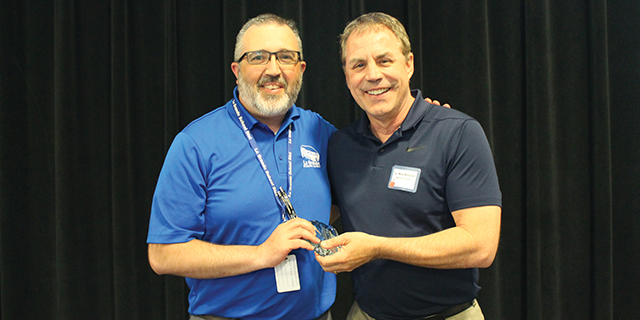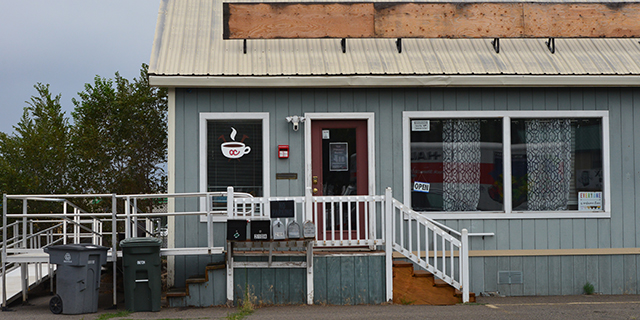Stepping in to provide mental health services
Published 11:27 am Friday, January 4, 2019

- Stepping in to provide mental health services
In 2017, Mental Health America, a nonprofit organization dedicated to providing resources for those with behavioral health disorders, ranked Oregon as the 49th state in terms of the prevalence of mental illness and access to care.
In Union County, the Center for Human Development — a nonprofit organization in La Grande that also administers public health and veterans services — is doing what it can to provide services necessary to help people who are experiencing mental illness.
Aaron Grigg is the mental health director at CHD, and Missi Brown, crisis coordinator for CHD, oversees the mobile crisis team. This team, made up of CHD staff, is dedicated to offering stability to someone whose life is chaos.
Mental, or behavioral, health is about emotional and psychological well-being, Grigg said.
Most people have had some kind of behavioral health issue in their life. Whether that’s losing a family member and going through the grieving process, bouts of depression or, on the extreme end of the spectrum, psychosis.
“Just like physical health, there are different levels of mental health,” Grigg said.
Even at the extreme end, there are differences in the cause of the behavior — from organic psychosis, like drugs, to a genetic psychosis, like schizophrenia.
Through a recent implementation, the staff at CHD created the mobile crisis team to lessen the need for visits to the emergency room.
When someone needs help — whether it’s because of suicidal ideations or any number of issues — he or she can call CHD’s crisis number and get the required care. Anyone can call the number at any time and someone will answer the phone.
Brown, who has been heading the team, said they can set up the caller with a counselor and case manager, who can assist with overcoming any barriers to stability the individual is facing — whether it’s finding housing, paying for utilities or food, or receiving therapy and/or medications.
CHD also provides peer support for those who want to talk with someone who has recovered from a behavioral health disorder or has been diagnosed and has it under control.
“Speaking with an expert — someone who went through the same thing — can be a very powerful tool,” Grigg said.
Brown said one of the aims of the crisis team is to head off an emergency situation before it happens.
“If we see someone struggling, we want to make it better before (they go to the ER),” Brown said.
Along with the CHD team, first responders to a scene of a crisis situation can also be the paramedics and EMTs. La Grande Fire Chief Les Thomas said his staff often is called upon to attend to emotional issues as well as medical.
“It’s about treating the person as a human being,” he said.
Sometimes they’ll respond to an elderly patient who really just wants a person to talk to.
On the other end of the spectrum, patients in psychosis can be extremely aggressive.
“There’s a safety factor,” Thomas said, for the patient as well as his staff, and the paramedics can sedate the patient if need be.
Law enforcement and the fire department are trained to safely secure a patient who is in this type of psychosis, Thomas said. It is their job to get the patient to the hospital to be treated.
April Brock, Grande Ronde Hospital Emergency Room’s nurse manager, said the hospital deals a lot with mental health patients. She said mental illness is a medical problem just like heart disease or diabetes.
Grande Ronde Hospital can provide a safe place for patients experiencing mental illness, but it’s not necessarily equipped for it.
For those with serious mental health disorders, Brock’s priority is to keep the patient — and her staff — safe.
“These people have generally stopped taking their medication,” Brock said of those who come to the ER. “We worry they’ll hurt themselves or others.”
The Observer previously reported GRH has added security staff to protect its staff members, as well as patients and visitors, from violent behaviors.
Someone who is in a drug-induced psychosis is a prime example of why the hospital had to add that extra protection.
“The security’s uniform is an authority (for patients),” Brock said in a previous interview. “They’re trained in de-escalation. They’re good at talking people down.”
The worst psychosis to deal with, she said, is the drug-induced kind.
Depending on the drug consumed, the induced psychosis can last for days or weeks or can even be permanent. Methamphetamine is common in the area, and it can take someone the better part of a day to come down from it. However, bath salts, which has made an appearance in Union County, is even more extreme and can give a person unimaginable strength and vivid delusions.
“It’s currently seen to cause the most paranoia,” Brock said.
With those kinds of induced psychosis, she added, the only thing to do is wait for the impaired person to come out of it.
In response to the violence the ER has experienced, the hospital added “garage doors” to special rooms where potentially violent patients can be placed.
The key to treating the patients is safety for everyone, Brock said.
Whether the patient is there voluntarily or involuntarily, generally with law enforcement, the hospital staff accommodates the situation as much as possible.
If the patient is suffering from delusions, the staff at the hospital do their best to pacify. If the patient believes they’ve been assaulted, then law enforcement will be called to take a report.
While the CHD crisis team has slowed the traffic of patients in psychiatric distress in the ER, the mental health system is broken, Brock said. There aren’t enough beds at GRH to comfortably keep patients suffering from mental illness. There are also limited beds available in the Eastern Oregon region.
“(Mental health) is probably our biggest crisis,” she said. “We need young bright professionals who want to go into the mental health field. On the ER side, it feels like we’re reacting instead of being proactive.”
Until that time, CHD is trying to provide as many services as possible to fill the need for the community.
“CHD has a vast array of services. We’re working toward a healthy community,” Grigg said.





